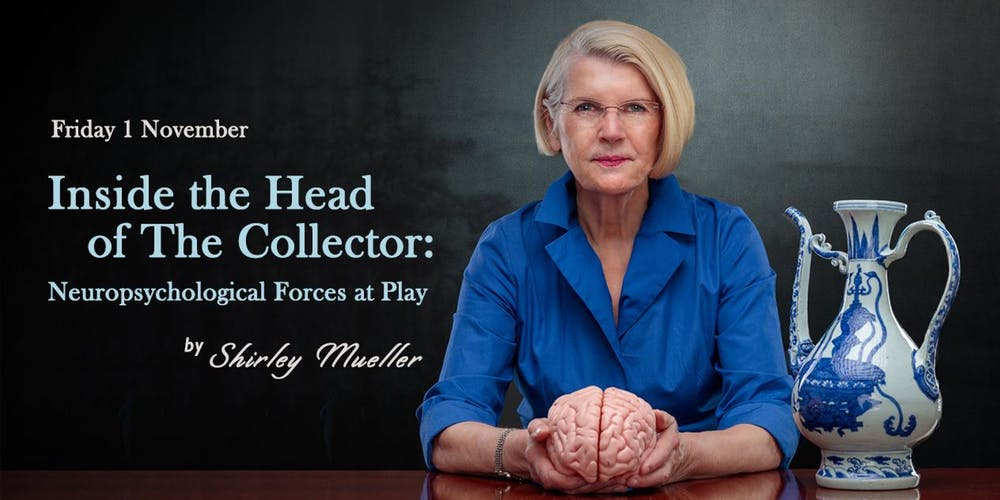Ahead of Dr. Shirley Mueller’s talk and presentation at Asia House London, The Art Collector asked Dr. Mueller about her book, Inside the Head of the Collector: Neuropsychological Forces at Play. The presentation, on Friday, 1 November 2019 (18:45 – 20:30 GMT) will be followed by a drinks reception with the opportunity for guests to ask Dr. Mueller questions. Tickets can be booked via Event Brite.
At what point in your collecting life did you start to self-analyze your process? Or have you always been self-conscious of your choices?
What a good question. If left to my own devices, a self-analysis may not have happened as I was having so much fun collecting. But I was writing for a physician newspaper as well and included behavioral economics in some of my columns. This prompted me to think more deeply about how its principles influenced me when I made collecting decisions. I found that I was sometimes prejudiced by preconceived notions of price (anchors), buying because of the time I spent on researching an object (sunk cost) and other related cognitive foibles. This awareness made me a better collector and I wanted to share it with others.
Can you shortlist a few positive and a few toxic behavioral traits that arise from collecting?
Collectors, I believe, are overall happier people as we have a goal or mission outside of our everyday duties. As I say in the introduction to my book,
“Collecting isn’t a job. Collecting isn’t a hobby. It’s better. It’s a passion.”
The toxic part of collecting would be those who hoard, only 3-6% of collectors. They are very different from the rest of us because we enjoy our collection; hoarders do not.
As a follow up, are these traits universal for all collectors?
Yes, in general, this would be true.

Several collectors we have interviewed would not label themselves as collectors. Rather, they consider themselves ‘custodians’ of art works and historic objects for the next generation.
Ah, what a wonderful way to describe a collector and her or his collection. Yes, a collector may hope to build a legacy by passing on special objects to future generations. This is a recognized reinforcer of the drive to collect. Other reinforcers include intellectual satisfaction, a feeling of becoming closer to past generations, a sense of history, etc. (I can provide a complete list if desired).
Does this mentality differentiate these collectors from others who view art as investment (both personal and financial)?
Definitely. For me, those who view art as an investment are in totally different category than those of us who collect because we love our objects for themselves. In fact, I have a whole section on this subject in my book, chapter 12. A summary is below. Specific HNWIs refer to high net worth investors who invest in an art fund or private art advisor rather than selecting and enjoying art on a personal basis. Their goal is to make money, which is their enjoyment, rather than investing themselves in the art itself.
What of collectors who donate vast bodies of works to museums/foundations – does the same investment mindset (versus solely the legacy appeal) apply to them?
In my mind, these collectors really do want to contribute to the public good. They are not investing in art for profit. Rather, I think, they must do something with their beloved collection at the end of their life, and, rather than selling it, decide to share it with a wider audience. Their collection lives on, which means, to a certain degree, they live on as well.
You are both a collector and scholar of Chinese export porcelain. At what point, for you, does academia intersect with the passion for collecting.
While in academia, I did the research for and wrote 70 scientific papers and was first author on fifty. The discipline to do this gave me the background to look at Chinese export porcelain in a methodical way. This organized approach enhanced my collecting ability and led me to make observations worthy of publication in journals that focused on Asian art. In this way, my interest in art was simply a continuum of my activity in academia but applied to a different subject.
As an extension, do you think all collectors should have (in depth) prior knowledge of art works they collect as opposed to collecting for the (aesthetic) pleasure alone?
I believe either works. Starting from the aesthetic is just as valid. Most collectors learn as they go along. It is inevitable.
Though I still prefer an object that appeals to me in an intellectual way, I have learned to appreciate the beauty as well. Others, who start from the aesthetic side, surely must slip over into a greater knowledge base at some point as well.
What advice would you give to someone who is quite passionate about art but has a very limited budget?
If you haven’t chosen an area yet, look for the undervalued. Go to fairs and conferences, read books and associate (if possible) with those who are like-minded. In a few years, you will surprise yourself because you will truly be a different person. I predict you will like the result.
Dr. Shirley Mueller will be talking at Asia House on Friday, 1 November 2019 at 18:45 – 20:30 GMT. You can book tickets for this event by clicking here.




 Saving...
Saving...